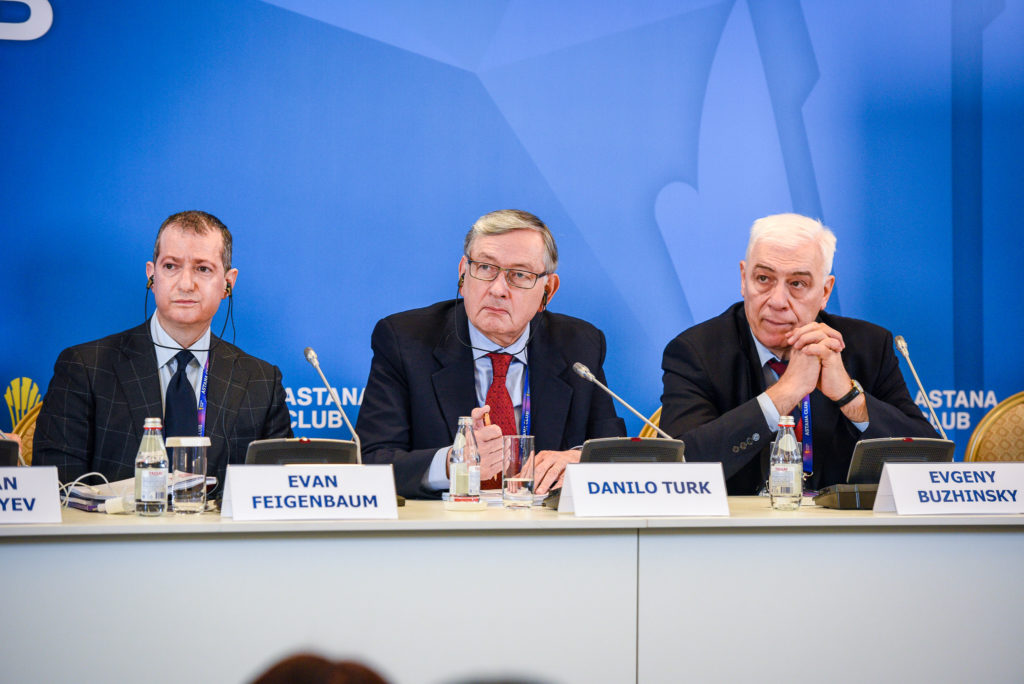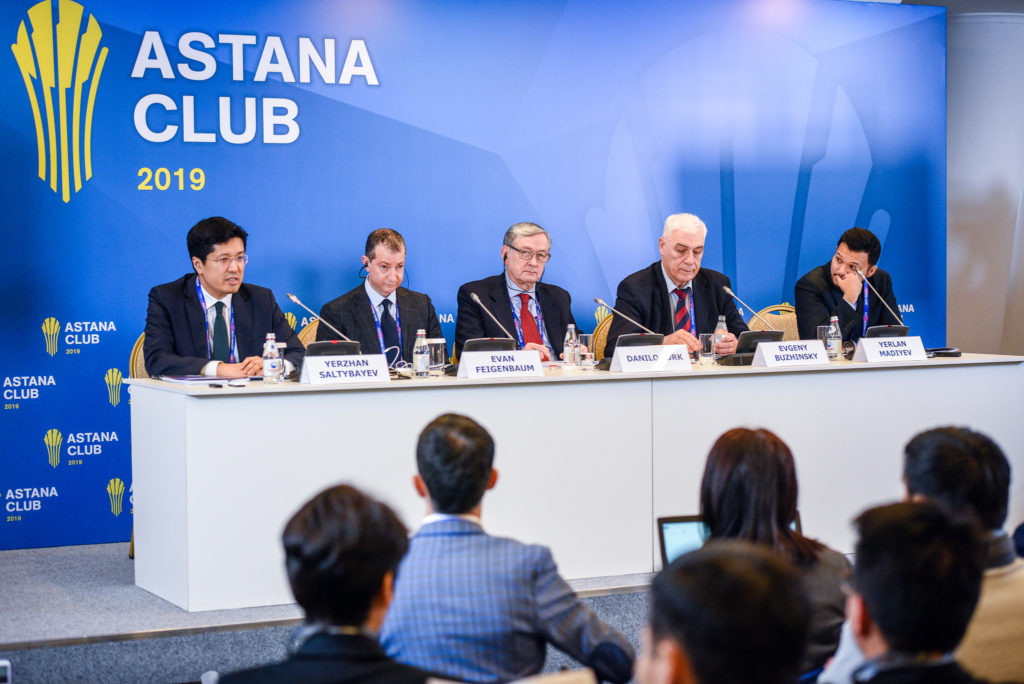NUR-SULTAN – International experts presented the report on global risks in 2020, which assesses and attempts to forecast the most essential dangers for Eurasia, Nov. 11 as part of the fifth annual Astana Club session. The report lists ten possible global problems that could occur in the upcoming year.
“The security horizon globally has been looking rather bleak for the last few years. A number of elements in this now emphasise the breakdown between the U.S. and Russia. One would also look at the crisis on trade between the U.S and China. Look at the impact of climate change, which is getting more and more serious, and it will get more serious in the next decade and a half at least, regardless of what good measures are taken by greener economies. We look at the pressures of demographic change and pressures of growing inequalities worldwide. And then, on top of all that, is the challenge of new technologies, the forward march of which never stops,” said Stockholm International Peace Research Institute (SIPRI) Director Dan Smith.
Approximately 40 global experts, including the heads of international think tanks, leading politicians and diplomats, participated in developing the risk list. The club also expanded the number of respondents from 1,000 from 60 nations last year to more than 1,100 from 70 nations.
The first risk, and perhaps the most inevitable, is the outcome of next year’s United States presidential election. Donald Trump is already launching his re-election campaign, while his opponents threaten him with impeachment. Considering that the U.S. is one of the world’s leading powers, the uncertainty in their political sphere affects the rest of the world.
“Trump’s hypothetical departure would make relations with China easier and relations with Russia would stay at about the same level, but would be more predictable,” noted Smith.
Risk two is the concern that the capital outflow of developing economies could cause their currencies to plummet, which in turn might spiral into global economic recession.
The possible escalation of a China – United States confrontation induced the most interest among the press. Carnegie Endowment for International Peace Vice President Evan Feigenbaum suggested the problem between the two is structural, which is represented in the difference of political systems and ideologies.
“Despite all of the economic interaction, not only has the security competition not decreased, but intensified, and worse, the security now is bleeding into the economics. It will disrupt the flow of people capital and technologies; that’s the core of the risk, and, also a potential for the escalation. Even if there’s a trade deal between the United States and China, it will not eliminate many of the structural factors. I predict that five years from now this relationship will be quite different than it is now,” added Smith.
Fourth on the list is the probability of the world entering the new stage of the arms race. This year was marked by the dissolution of the Intermediate-Range Nuclear Forces Treaty (INF), which in the future could result in “a total nullification of the ‘rules of the game.’”
Exacerbating the struggles for technological domination rounds out the top five risks. The U.S. ban on Huawei and ZTE products on its territory was a trial run for future segmenting the IT market and technological field.
The next entry is a direct consequence of the fourth risk. Besides the INF dissolution, aggravating the confrontation around Iran, and a possible military campaign against it, could also spread into cyberspace and potentially hold the Middle East security system hostage.
The progress of a North Korean peace treaty with the United States is moving slowly, which puts it at risk of failure. The 2020 U.S. presidential election could have more connotations than the first entry implied and the negotiations might fail. There is also a risk of nuclear weapon development acceleration.
“For North Korea, nuclear weapons at some point became a survival instrument. The world is threatening the existence of this nation, so, like a cornered cat becomes a predator, North Korea looks at nuclear armament as a means of self-protection. In solving this question, the opinion of both Koreas should be taken into account; it is their question,” said Chairman of the Supervisory Board of the Dialogue of Civilisations Research Institute Vladimir Yakunin.
The eighth risk is the new surge of terrorism, which is expanding the geography of its actions. In additional are loner terrorists and so-called white terrorism, which endanger people of other confessions, especially Muslims and migrants.
“Terrorism is only one of the risks we discuss today, but maybe not the biggest one. Compared to the number of victims of diseases, especially caused by environmental pollution, the victims of terrorism are not as many. However, the political and social impact of this phenomenon is impossible to exaggerate,” he added.
The next risk is the wave of aggressive populism and nationalism caused by the desire of politicians to use simple solutions to complex issues in order to please the masses, which can result in social, ethnic and religious conflicts.
The last item on the list is the problem of climate change. Conflicts among nations might prevent them from focusing on this issue.
“There’s a number of destabilising, discomforting factors in world politics. I think that the core problem is that at the time when we face more problems requiring deeper and wider cooperation than ever before, we also see a declining appetite for cooperation among some of the great powers,” said Smith regarding the entire list.
Astana Club seeks to create neutral ground to bring together representatives of Europe, the United States, China and Russia who do not participate in each other’s forums.
“We are at the stage in world affairs where we are relatively clear about things that do not work. What we are less clear about is how to move forward, how to make solutions. For that you need to repeatedly bring together the best minds and get people talking, because only out of discussion and exchange of ideas, including disagreement, will come positive effect. Because of who it attracts and perhaps also of being in Central Asia, as a meeting point of problems, Astana Club has a particularly significant part to play in this continuing discussion,” he added.


